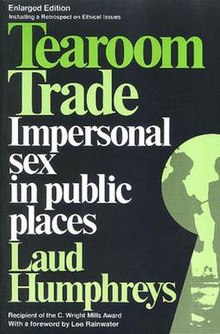 | |
| Author | Laud Humphreys |
|---|---|
| Language | English |
| Subject | Homosexuality |
| Publisher | Duckworth |
Publication date | 1970 |
| Publication place | United Kingdom |
| Media type | |
| Pages | 180 |
| ISBN | 0-7156-0551-8 |
Tearoom : Impersonal Sex in Public Places is a 1970 non-fiction book by American sociologist Laud Humphreys, based on his 1968 Ph.D. dissertation "Tearoom Trade: A Study of Homosexual Encounters in Public Places." The study is an analysis of men who participate in anonymous sex with other men in public lavatories, a practice known as "tea-rooming" or "cottaging".[1] Humphreys asserted that the men participating in such activity came from diverse social backgrounds, had differing personal motives for seeking sex in such venues, and variously self-perceived as "straight," "bisexual," or "gay."
Tearoom Trade debunked many of the stereotypes associated with individuals who participate in anonymous male-male sexual activity in public places, demonstrating that many of the participants lived otherwise conventional lives as family men and respected members of their communities; further, their activities posed no threat to non-participants.[1][2] In the course of his research, Humphreys misrepresented his identity and intent to his subjects, and tracked their identities through their license plate numbers. Tearoom Trade has subsequently been the subject of continued debate over privacy for research participants, with The New York Times noting that Tearoom Trade is "now taught as a primary example of unethical social research."[1][3]
- ^ a b c Earl R. Babbie, The Practice of Social Research", 12th edition, Wadsworth Publishing, 2009, ISBN 0-495-59841-0, p. 75-76
- ^ Cite error: The named reference
sieberwas invoked but never defined (see the help page). - ^ Mac Donald, Laura (2007-09-02). "America's Toe-Tapping Menace". New York Times. Retrieved 2007-09-02.